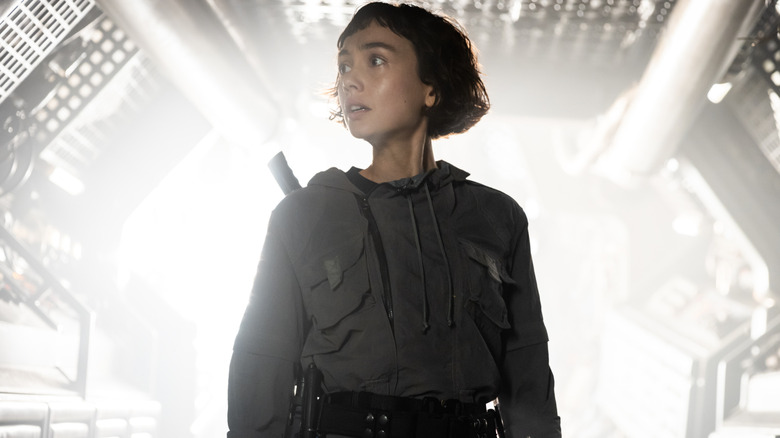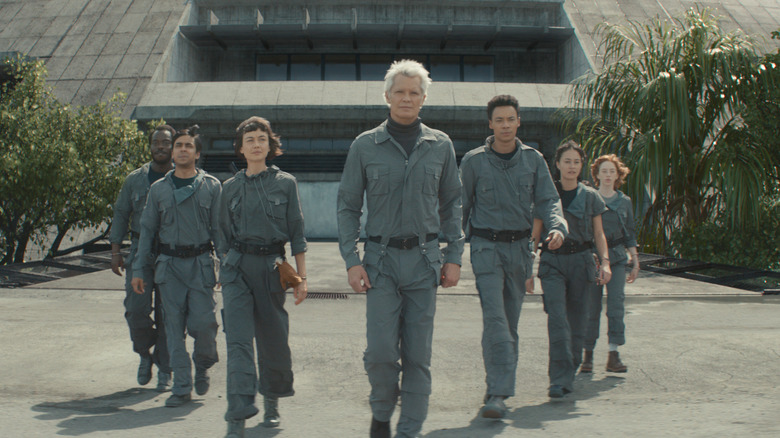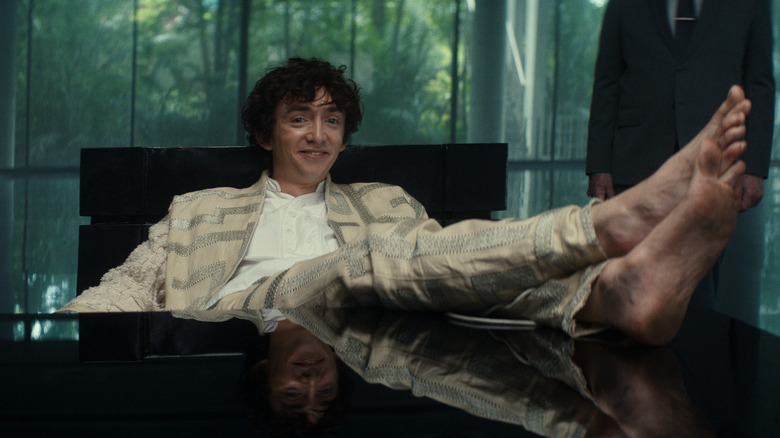Alien: Earth Review - Noah Hawley Delivers Big Ideas And Sharp Horror
- Talented ensemble
- The action and horror really work
- Packed with big ideas that just keep expanding
- The first episode is possibly the weakest of the series
The "Alien" franchise does not, at first glance, feel like the kind of thing suited for the longform storytelling of television. It's a world whose greatest successes are built on high-concept hooks, executed well, in and out in your average blockbuster runtime — so of course there's the fear that stretching any narrative involving a Xenomorph out beyond that will dampen the energy and the blend of cosmic and sci-fi horror.
But "Alien: Earth" has a secret weapon, and that's Noah Hawley. The writer and producer who made "Fargo" a celebrated TV anthology and turned a semi-obscure Marvel Comics mutant into the trippy "Legion" can always be counted on to take risks, to push beyond the boundaries of what we think we know with these concepts. He's got a track record of making it work, and if anyone could turn "Alien: Earth" into the longform TV adaptation of our dreams, it's probably him.
While "Alien: Earth" does at first seem a bit scattershot in its ideas and story threads, what Hawley has imagined for the franchise's first TV series ultimately pays off in dazzling, thoughtful, compelling ways. It might take a moment to realize it, but when it's at its best, this is the "Alien" TV series we've been waiting for.
The Xenomorph hits home
Set in 2120, a couple of years before "Alien" but after the events of "Prometheus" and "Alien: Covenant," "Alien: Earth" picks up the action just as a Weyland-Yutani research vessel is returning to Earth loaded with alien specimens, including certain very recognizable creatures for fans of the franchise. (Check out Looper's recap video if you need a refresher on the story so far.) When something goes wrong on board, the ship hurtles down to the planetary surface and crashes into a high-rise in territory run by Prodigy, the newest megacorporation to join the Trillion-Dollar Club of five who basically control the entire planet.
Prodigy's egotistical and eccentric founder, Boy Kavalier (Samuel Blankin), has been spending his time working on a breakthrough in synthetic human technology. He's just created Wendy (Sydney Chandler), the first human consciousness to be successfully transplanted into a synthetic body, thus skirting humanity's natural lifespan. Wendy, a child with a highly advanced, fast, and strong young adult body, is the next phase of transhuman evolution, but she also wakes up to the wider world just as this mysterious ship arrives in Prodigy's lap. Hoping to secure whatever might be on board for Prodigy and get a leg-up on Weyland-Yutani, Kavalier sends Wendy, her synthetic mentor Kirsh (Timothy Olyphant), and a group of fellow synths into the fray, where they discover a payload of monsters amid the expected carnage of a crash site.
That's about all the plot we can comfortably unveil ahead of the show's premiere (though press was given access to all six episodes for review), but it's more than enough to get started. Noah Hawley and his writing team break the saga into roughly two arcs, one following the crash event itself and the other following the aftermath as Prodigy grapples with what they've found. But it all begins with a jam-packed, two-episode premiere that hits the audience with a half-dozen tantalizing ideas all at once. As we've already mentioned, it takes a moment or two to ramp up, but once all those ideas are in play and we can see the trajectory of this story, it becomes something from which you can't turn away.
A show full of grand ideas
Though the first episode of "Alien: Earth" is a sometimes disjointed whirlwind, there are immediate tonal and visual decisions that prove deeply, wonderfully immersive. The series retains the 1970s future aesthetic from the original film, suffusing it with a certain late 20th-century American decline vibe even as it takes us a century ahead of our present moment. It's a smart decision, one that's enhanced by things like music choices and, yes, Easter eggs that fans of the larger franchise will no doubt recognize. Narratively, there are pieces from throughout the franchise, from the haunted house in space feel of the original "Alien" to the action-horror-comedy of something like "Aliens" or "Alien: Resurrection," but the show also owes a lot to the published-but-never-produced "Alien 3" screenplay written by cyberpunk icon William Gibson. It's a series infused with the horror of "Alien" and the action of "Aliens," yes, but it's also a show of ideas on a grand scale, and that's where things get really, really interesting.
At the center of all this is the alien creatures we all know and love infiltrating and rampaging through new environments, but the real emotional heart of the show is Wendy, and the world she's waking up to as she adjusts to the new paradigms of her life. She is, like the Xenomorph itself, a stranger in a strange land, recognizing the world but not quite grasping her place in it, desperate for connections that will stabilize her worldview. It's a deeply human story for her, and yet Noah Hawley often pulls back, revealing the greater machinery that made Wendy, and what each cog in that machine wants for themselves. Just as the Xenomorph might be an asset, contained and harvested and wielded like a weapon, Wendy is a product, the show floor model for a brand-new lifestyle adjustment available for the right price. The aliens that Wendy and her friends encounter across the series are parasitic beasts hoping to grow and evolve by latching onto hosts, and Wendy herself is beset by parasites of an entirely different kind. In a world where every decision is governed by money, and overseen by people who hold all the cards, what place does Wendy actually have? How much agency can she wield, and what happens when her goodwill and novelty run out? These are questions that have long been explored in the "Alien" franchise, a story for which corporate exploitation is just as important as monstrous cosmic intervention, and "Alien: Earth" is on track to be the fullest exploration of that idea yet. Sydney Chandler carries that emotion and thematic burden like a seasoned pro, making her the heart of the show even as Timothy Olyphant and Samuel Blenkin threaten to steal every scene.
"Alien: Earth" is an epic in every sense, a massive exploration of everything this franchise has touched on in the past and then some. That means that it begins as a sometimes unwieldy laundry list of sci-fi concepts, but once those concepts coalesce, the end of the two-part series premiere will have you hooked. It's a sci-fi horror stunner that's as timely as it is thrilling, and a must-see for "Alien" fans.
"Alien: Earth" premieres August 12 on FX and FX on Hulu.


